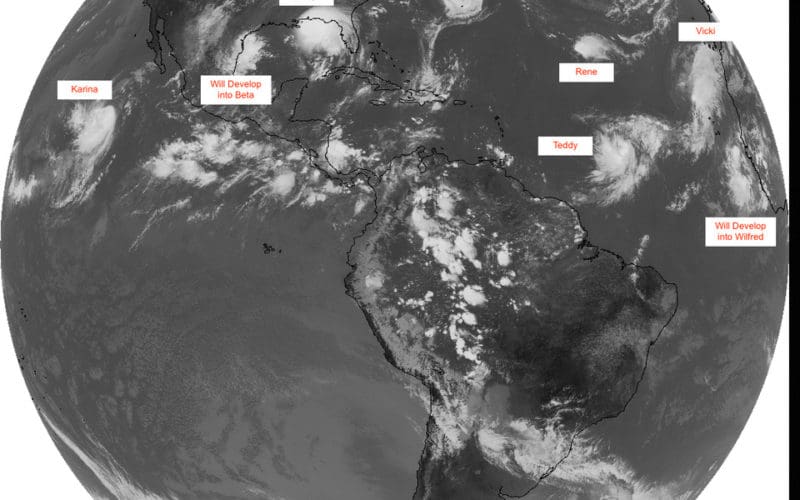The 2020 hurricane season was one for the history books. For just the second time in modern times, the list of Atlantic storm names was exhausted, requiring the use of the Greek alphabet. The last time this happened was in 2005, which was the year of Katrina. In that year, storm names extended six deep into the Greek alphabet, with the final storm that year having the name “Zeta”. For the 2020 season, the names went all the way to Iota (the ninth letter of the Greek alphabet). The final storm advisory for the 2020 season was issued on November 18th, while in 2005 storm advisories were being issued at the end of the year and actually extended into the first several days of January 2006.

Summarizing the 2020 Atlantic season, there were 30 named storms (the most ever), 13 of which reached hurricane strength (second only to 2005) , and six of those were major hurricanes, meaning category 3 or higher (the record is 8). 12 systems directly impacted U.S. coastal areas, including five in Louisiana alone.
Figure 1 captures the essence of the Atlantic hurricane season. It is a satellite image from September 14, 2020 that shows five named storms in the Atlantic Basin at the same time: Hurricanes Paulette and Sally, Tropical Storms Teddy and Vicky, and Tropical Depression Rene, which had been a tropical storm earlier. In addition to these five systems, the photo also shows disturbances that developed into Wilfred (the last name on the season’s list), Alpha and Beta within a few days after this image. And to top it all off, Tropical Storm Karina is visible in the eastern Pacific.
Figure 2 shows the tracks and intensities of all of the Atlantic systems for the 2020 season.

The lists of storm names are produced by the World Meteorological Organization (WMO). There are six lists of names for the Atlantic basin, so the lists are reused every seventh year. Systems that have a significant impact on a large area or population are typically retired from the lists and replaced the next time the list is used. In the active season of 2005, five names were retired (Dennis, Katrina, Rita, Stan and Wilma) which was the most ever for one season. Typically the WMO holds a meeting in the first quarter of the year in order to determine which names from the previous season will be retired, but this did not happen in 2020 due to the pandemic, so no announcement has been made yet as to which names from the 2019 season will be retired.
Candidates for retirement from the 2019 season will likely include Dorian which produced catastrophic damage in the northwestern Bahamas as a slow moving category 5 hurricane; and perhaps Humberto which impacted Bermuda with hurricane conditions.
Looking at the 2020 season, candidates for retirement include Isaias, which impacted a large portion of the Bahamas and the eastern U.S.; Laura which struck southwestern Louisiana and southeastern Texas as a major hurricane; Paulette which made a direct hit on Bermuda; Sally, which impacted southwestern Alabama and the western Florida panhandle as a category 2 hurricane; Delta, which crossed the northeastern Yucatan peninsula as a major hurricane, then went on to make landfall in southwestern Louisiana in almost the some place as Laura; Zeta, which also crossed the northeastern Yucatan peninsula then made landfall in southeastern Louisiana just below category 3 status; Eta, which made landfall in Nicaragua just short of category 5 status, then weakened to a depression over interior central America before emerging over the northwestern Gulf of Mexico, moving north across Cuba then turning west and moving through the Florida Keys as a strong tropical storm just below hurricane strength; and finally Iota which made landfall in Nicaragua in almost the same spot as Eta as a devastating category 5 hurricane. Ironically, Iota, the last system of the season, was also the strongest.
Likely not all of these eight names will be retired, but it seems that there is a reasonable chance that the record of five names retired in one season could be at least equaled. Also of interest, the WMO will have to decide how to handle systems with Greek letter names that are worthy of retirement. The usual procedure when a name is retired is to replace it with another name starting with the same letter on the list, but there is only one Greek alphabet. Speculating, it could be that if a decision is made that one of the Greek letter storms should be retired that letter will be skipped in future years whenever the Greek alphabet is used, or perhaps a substitution from the NATO phonetic alphabet might be used. Stay tuned!
This is a good time of year think about hurricane preparation. If you keep a boat in the water, or own property along or near the coast, making advance plans and arrangements will help in cases where boats need to be moved to safer locations or hauled, or evacuations are required. Advance planning can save valuable time when a system threatens. Though 2020 was a very active season with a lot of impact for the eastern U.S., this does not mean that 2021 will be similar, but for each individual situation, it doesn’t matter if a season is active or not. What matters is if one system impacts your area of interest, even if it is the only system of the year. Best to be ready.
Contributing editor Ken McKinley is the founder of Locus Weather(locusweather.com), which provides meteorological analysis and weather routing services.

